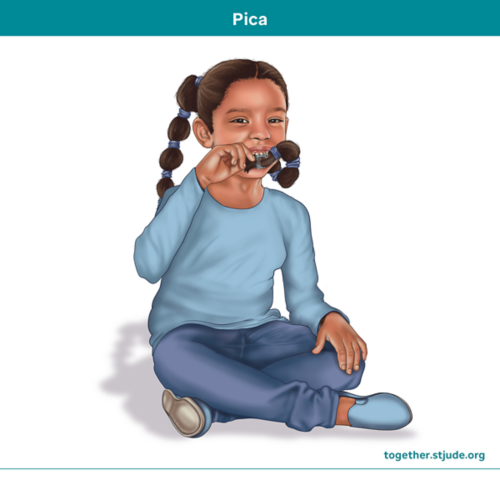Pica is an eating disorder that causes a person to crave and eat non-food items. These items can include things like dirt, clay, chalk, hair, paper, cardboard, baking powder, soap, ice, or paint chips.
Pica is more common in children and teens, pregnant women, and in people with certain mental health or medical conditions.
Pica can cause health problems depending on what your child eats and how often the behavior occurs. Complications of pica include:
- Anemia
- Lead poisoning
- Infection
- Diarrhea or constipation
- Bowel problems or blockage
- Malnutrition
- Tooth damage
The cause of pica is not well understood, but certain conditions can increase your child’s risk. These include:
- Sickle cell disease
- Nutritional deficiencies, such as low iron, zinc, or other essential nutrients
- Low hemoglobin
- Poor nutrition and hunger
- Developmental disabilities, such as autism or intellectual disabilities
- Mental health problems, such as anxiety, obsessive-compulsive disorder (OCD), or schizophrenia
- Pregnancy
Pica and Sickle Cell Disease
Pica is more common in people with sickle cell disease than in the general population. Experts do not know why this happens. Low hemoglobin, iron deficiency anemia, and zinc deficiency are possible related factors.
Talk to your care team if you notice signs of pica. For a diagnosis of pica, the eating behavior must:
- Last at least 1 month
- Not be typical for your child’s developmental stage. It is normal for infants and toddlers to put things in their mouths.
- Not be socially or culturally typical. In some cultures, eating certain non-food items might be accepted practice.
Eating non-food items can be harmful, depending on the type of item your child eats. Your care team might do other tests to look for health problems. These include:
A mental health provider might do an evaluation to see if pica behaviors are related to a developmental delay or mental health issue.
Because of the cravings, your child may have a hard time stopping the behavior. It is important to let your child’s care team know if you think your child has pica.
Treating pica involves several steps. Your child’s treatment plan will depend on:
- The type of food items
- How often the behavior occurs
- How long the behavior has persisted
- Underlying causes or risk factors
- Health problems that develop because of pica
Treatments for pica may include:
- Behavioral therapy to help your child manage behaviors and cravings
- Changing the environment so that your child cannot reach non-food items
- Counseling or psychotherapy to help your child cope with stress, anxiety, or mental health conditions
- Meeting with a dietitian to develop an eating plan and address nutrition concerns
- Medical care to address possible underlying causes of pica and treat any health problems
If you have questions or want to learn more about pica, talk with your care team.
It can help to keep a record of your child’s eating behaviors. Write down what your child eats, when the behavior occurs, how much or how often it happens, and any problems or side effects.
Seek medical help right away if you think your child has eaten anything that could be poisonous or harmful.
Questions to ask your care team




